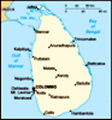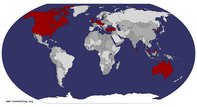Advertisement
Published: January 4th 2014

 Bed tea-a great invention!
Bed tea-a great invention!
First thing in the morning a tray of hot tea is brought to your room to get you up and going for the day.A typical day in Sri Lanka:
Having spent 11 weeks in many parts of Sri Lanka, I'd like to let you know what a typical day was like for us.
There was no need to set an alarm because we would wake up at 5 or 6am to the sound of Buddhist chanting, which would go on for an hour, or the Muslim Call to Prayer, depending on where we were.
Into the shower--nearly always the only option was COLD water--and I would stand still with my arms down and fingers outstretched feeling the warmed water running off my fingertips as the shower extracted the heat of the night from my neck, shoulders and back and left me refreshed for the new day.
I would rummage through my suitcase looking for something acceptable to wear. I had packed mostly sleeveless shirts in Australia, to deal with the hot climate. But I soon learned that for a woman to show her shoulders was culturally unacceptable. Sri Lankan women, in their saris, can have low-cut fronts, almost absent backs, and show their skin from below bra level to their waists, but their knees and shoulders must be covered. I

 Before anything else--check the email
Before anything else--check the email
Our link to home and friends called to us urgently each morning.actually noticed some young working women with their saris hitched below their belly buttons, even a couple hardly above their pubic area, but showing shoulders was a no-no! Even a taxi driver gratuitously warned me that I mustn't wear "cut sleeves" to the temple.
If I chose to wear slacks (never shorts!) I had to be sure I had a blouse that fell to my upper thighs, so no crotch outline, ever.This meant that I had to do some clothes shopping in Sri Lanka, but that was ok. I was happy to buy some lovely long Sri Lankan blouses.
Soon "bed tea" would be delivered to our room or our verandah. This was a tray with hot water in a pot, tea bags, cups, milk, sugar, and sometimes instant coffee, to jog us into the new day and tide us over till breakfast. In the meantime we could hear the little bread trucks going up and down the street, always playing the signature notes from Fur Elise--what would Beethoven think of this?? Or the tune from Disney's "It's a Small Small World". The bread trucks were little tuk tuks (3-wheelers) with clear cabinets in the back with shelves

 Indian sari
Indian sari
The Indian style sari wraps diagonally across the chest and falls over the shoulder.of bread and rolls, or sometimes they were even motorbikes kitted out.
Breakfast could be hoppers. These were made from a rice flour and coconut milk batter which had sat overnight so it had fermented slightly and when cooked resulted in a light textured, basket-shaped pastry with holes, crisp around the rising sides and with a thick spongey bottom. Sometimes we had egg hoppers, which had a cooked egg inside the basket shape. Hoppers were served with a sweet onion mixture, but I used to put butter and jam on mine, showing my ignorance and dislike of onions.
Another typical breakfast was "milk rice", a 2 cm thick layer of firm cooked white rice, served on a platter and always divided into diamond shaped segments. Also served with an onion dish. And of course, there was always more tea and several super-sweet tiny bananas.
Back in our room, I'd compulsively check my email and pay Australian bills on line, if needed. Then I'd put on my sunglasses and slap on a hat. No one else in all of Sri Lanka seemed to wear a hat--the women used umbrellas for shade--boy was I obviously foreign!
Out we'd

 Kandian sari
Kandian sari
The Kandian sari has a little frill around the waist and covers the front with a vertical rise of cloth which then falls over the shoulder.go for the day's activities, having arranged our plans around how much urgent need for a toilet either of us had that day--a sorry fact of life when travelling.
Everywhere there were cows roaming the streets or munching grass along the side, dogs having a nap, big crows and small squirrels the size of chipmunks. There are almost no sidewalks in the country, so getting along down the road is a matter of staying alert about oncoming traffic and being ready to jump over a deep gutter and into the grass if needed. But mostly the vehicles were good at dodging pedestrians, and other people, even very old and young, carried on walking without seeming to pay any attention to what was passing them by.
Crossing the road seemed quite treacherous, but we were told to raise our hand high to signal we meant business, step out onto the road and KEEP GOING.
Sri Lankans are exceptionally friendly and strangers on the street nearly always greeted us with a smile or wave, so we tried to get our greetings straight, too. In Sinhala-speaking parts, "Ayubowan", with hands in the prayer position (like namaste in India) was a

 Kandian sari
Kandian sari
The Kandian sari can show more of the bare midriff: front, sides and back, but the shoulders are always covered. Leaving me wondering: What determines an erogenous zone?common greeting, and means something like "May you have a long life". "Sthuthi" means thank you. At first we couldn't get our tongues around that one and Phil was heard to say "sushi" and I said "tutsi". Needless to say, our meanings were quite opaque to the listeners! But we did get it in the end. And "Vannakam" for hello in the Tamil speaking areas, and "nandri" for thank you.
People were generally very willing to talk, often happy to practise their English, waggling their heads gently left to right in polite agreement with what you were saying, but if their mobile phone rang, people ALWAYS answered it, no matter where they were or what else was happening.
Along the road were lots of tiny shops, one room only, which opened to the street. The owner served from a front counter and the back area was dark and possibly cooler. No lights on. This system left us pointing and miming, but we were usually able to get our request across without too much trouble, and most everyone had a smattering of English. We learned to always keep lots of rupees in small notes because getting money changed was

 Covering up to be culturally ok
Covering up to be culturally ok
OK, you don't see much of me now!very tricky. Even the railway didn't want a 500 rupee note, though it was only worth about $5.
Lunch was the big meal. Rice and curry and the most delicious papaya for dessert. We'd always be given bottled water and had been warned to make sure the seal was unbroken before drinking it.
Sri Lankans eat with their fingers, mixing all their foods together into sticky balls before popping them into their mouths. But we were always given forks. We were also given wonderful fresh fruit drinks, a memorable one being a brownish one made from "wood apple", a fruit which looks like an apple but has a very hard outer casing that has to be cracked open with a sharp implement.
At the end of the afternoon, we'd be back in our room, struggling again with the internet to stay connected. Reception was quite waivering in many places. Dinner was very late by our habits--usually 8pm--so we faced several hours of "what to do?" We were usually very tired and had a rest on the bed for a while, but it was at this time of day that I really noticed the lack of our usual

 Daily deliveries
Daily deliveries
Many goods are transported on motorbikes.activities. If I subtracted planning meals, shopping, cooking, washing up, gardening, visiting with friends, sewing, going to the movies, watching tv--what was left??? For us, the computer and books. But for a stretch of about 3 weeks I didn't even have a book--bad planning, not easy to find a book in English in small towns. Gazing outside felt pretty slack after a while. But sometimes we'd hear the bang of the monkeys landing on the roof and watch to see them chasing across the grounds.
There were days, though, when we had to do some laundry, and this had to be done by hand in a bucket found in the shower. This took some getting used to for us, but in the end we took it in our stride. The bedrooms always had drying racks for freshly washed clothes. Other people at home laid them on the grass and on bushes.
Finally it would be time for dinner. At the dining room we had to be careful to sit at the correct table, as there is a well understood social hierarchy observed in Sri Lanka. We were always treated most deferentially, to our embarrassment, and were usually seated

 Sidewalk? Forget it.
Sidewalk? Forget it.
Take care as you walk along the road as you may need to leap out of the way quickly, though mostly things go around you.at a head table on our own, whereas I would have loved to chat with the others. The evening meal was a smaller one, often fried eggs or string hoppers, which were little piles of "strings" made of a rice flour dough and laid in a pile of loose balls on a platter.
Walking back to our room, it was fun to spot the fireflies which were bright pinpoints of light which, rather than the blinking we've seen in other places, stayed on long enough to make a short trail through the air. Back in our rooms, there were candles and matches for when the electricity went of, which it did now and then, and some places had battery-powered tube lamps as well.
Our final decision of the day was whether to use the fan or the air conditioner. We tried mostly to use the fan, with the thought that that was the greener option, which may not be true given it has to spin all night. But in any case, there was one place where the fan above the bed had only one speed--turbo ferocious--and sleeping under it was a test of endurance and the ability to

 Typical little shop along the road
Typical little shop along the road
Goods are hung in long pendulous clusters, chips, bananas, lollies, whatever.NOT "be here now".
Advertisement
Tot: 0.063s; Tpl: 0.014s; cc: 14; qc: 26; dbt: 0.0399s; 1; m:domysql w:travelblog (10.17.0.13); sld: 1;
; mem: 1.1mb




























Nathan
non-member comment
make me crave to see the natural scenary.
Really Martha, you make me crave to see the natural scenary and I feel sad because while I was living there, I could not see those beautiful things by the war. but eventhough the war ended, I could not visits there because of scaring to live there.